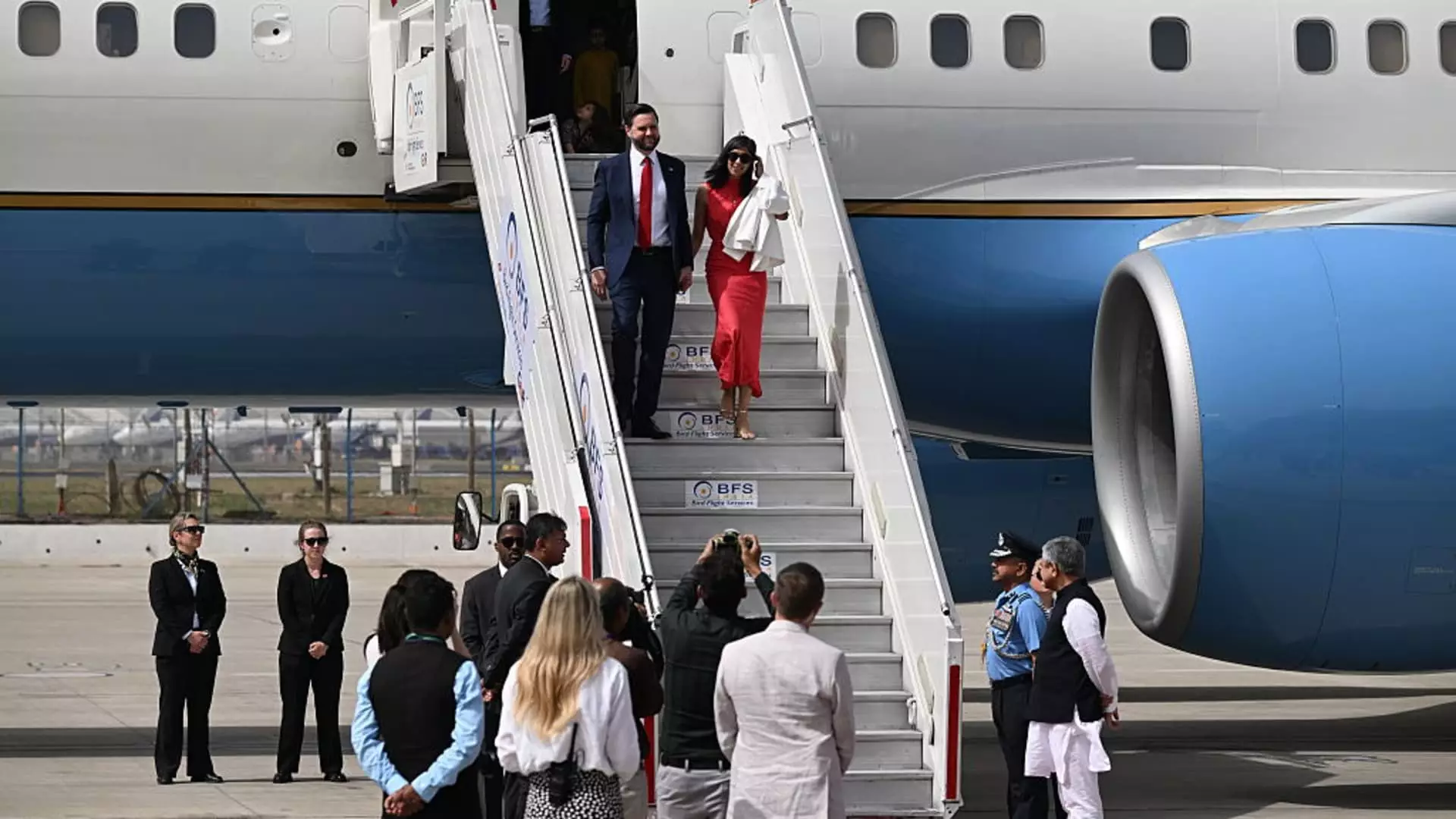In the grand theater of international politics, the recent visit of U.S. Vice President JD Vance to India occurs at a moment brimming with opportunity and tension. With a flurry of discussions on trade, defense, and bilateral relations, the stakes couldn’t be higher for both nations. Their deliberations are not merely confined to the personal—Vance’s familial ties resonate through his visit, but they also embody the global political climate, marked by shifts in economic structures and alliances. As the world’s largest democracy engages with one of its most powerful allies, one must ponder whether this meeting can provide the framework necessary to navigate the intricate pathways toward mutual benefit.
Vance’s visit isn’t just another diplomatic jaunt; it’s a strategic maneuver aimed at bolstering the U.S.-India relationship, particularly as the two countries grapple with rising tariffs and trade disputes. Notably, Prime Minister Narendra Modi’s efforts to stave off steep U.S. tariffs reflect a keen desire from New Delhi to foster a more collaborative atmosphere. The urge to seal an early trade deal underscores how critical economic partnerships have become in the face of overarching global tensions, especially the turmoil arising from the U.S.-China rivalry. It brings to light the poignant necessity of ensuring that both countries not only harmonize their interests but also protect their individual economic landscapes.
Weddings and the Taj Mahal: Personal Meets Political
While Vance’s trip includes personal highlights like visiting the Taj Mahal and attending a wedding in Jaipur—an opportunity to engage with the cultural fabric of Indian society—the political undertones remain undeniable. The significance of such family-oriented events during an official visit speaks volumes about the depth of relationships that extend beyond diplomats and government officials. Wouldn’t it be refreshing if political leaders actively embraced the human side of their roles? Engaging in cultural exchanges highlights how interconnected global relationships can be, yet one wonders how often these moments pave the way for lasting political outcomes.
Vance’s personal ties through his Indian heritage will play a crucial role during discussions. How often do political figures possess the luxury of anchoring their diplomatic engagements in personal experiences? This unique dynamic can serve to enhance dialogue, fostering an atmosphere of empathy—something that can be critically lacking in typical political discourse. It adds weight to Vance’s mission, prompting reflections on the role of personal narratives in shaping global strategies.
The Power Dynamics of Trade Talks
The visits from Vance coincide with negotiations that are anything but simple. A mere glance at the economic numbers reveals a complex interplay of trade relationships, with India boasting a substantial surplus in its favor against the United States. The question that lingers is whether such numerical victories can translate into favorable outcomes in the realms of policy and diplomacy. As the gears of trade deal discussions turn, the pressures intensify with Trump labelling India a “tariff king.” How much longer can these labels persist without translating into serious consequences?
Moreover, it’s critical to question what “fairness” in trade really means. Vance’s discussions will inevitably reflect a face-off between competitive nationalism and collaborative internationalism. As the U.S. pushes India to reduce tariffs under the guise of promoting fairness, one is led to consider the implications for domestic policy in India. Will the Indian government yield to pressure, sacrificing local interests for broader economic partnerships? The concern is valid, especially as both nations approach the negotiating table with a sense of urgency fueled by external pressures.
Defensive Postures Amidst Trade Dialogues
Beyond the realm of trade, arms deals, and defense partnerships loom large over the discourse. The potential procurement of defense systems like Javelin missiles exemplifies the intertwining of military needs with diplomatic maneuvering. The notion that India may be pulled into arms expenditure negotiations to sweeten trade talks is a troubling proposition. Shouldn’t we be wary of conflating economic engagements with military alliances? The implications of such partnerships extend beyond bilateral ties, impacting regional security dynamics and raising ethical questions surrounding arms exports.
In a world increasingly defined by shaky alliances and nationalistic fervor, it’s crucial for leaders like Vance not just to seek immediate gains, but to consider the long-term repercussions of their diplomatic strategies. The question remains: will this visit catalyze a more profound and responsible kind of engagement or merely serve as a band-aid for underlying tensions? While the clock ticks down on proposed trade timelines, it’s vital to approach such high-stakes diplomacy with both optimism and a critical eye, mindful of the delicate balance between competing interests and the ethical implications of alliances formed in the name of mutual benefit.

Leave a Reply